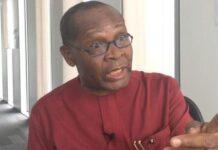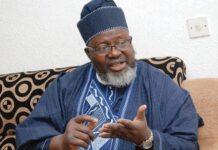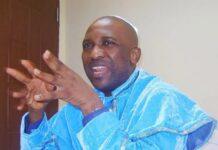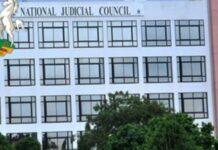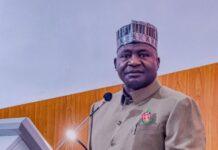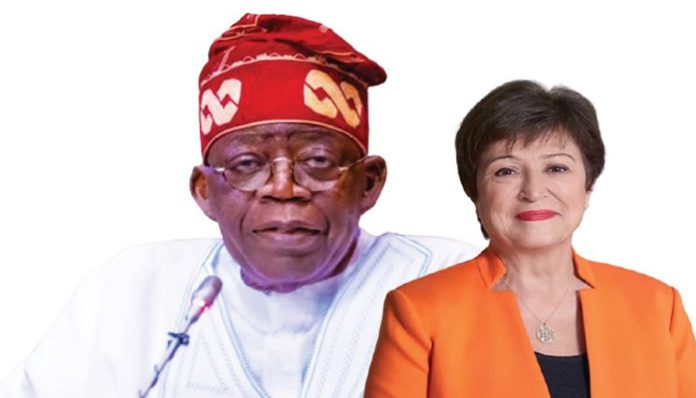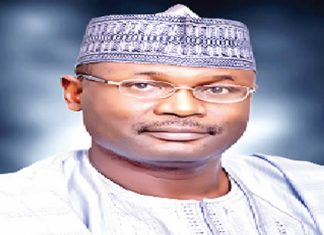

Daniel Adaji examines some of the suggestions of the International Monetary Fund to the Federal Government and their contributions to Nigeria’s economic woes
Nigeria’s economy has suffered severe stagnation since the 1980s. There are two schools of thought to Nigeria’s poor economic situation; while Eurocentric literature blames the civil war and poor leadership in the country, the Afrocentric literature dates Nigeria’s economic distress to the era of colonial suppression and economic exploitation.
However, none of these thought lines relates the policies of the International Monetary Fund to Nigeria’s failing economy.
There is a common saying that he who pays the piper calls the tune. The same can be said of the interference of the International Monetary Fund with Nigeria’s economy and policies. The IMF is the world’s focal organisation responsible for international monetary cooperation. It is otherwise seen as the United Nations autonomous and specialized agency saddled with the responsibility of fostering stability and economic growth globally.
Conceptualized in the UN-sponsored Monetary and Financial Conference in Breton Woods, New Hampshire, it was created in 1946 with 46 members. The IMF has incorporated 193 countries as of the last count.
It was birthed to prevent another strike of the great economic depression that occurred in the 1920s and 1930s.
Nigeria’s journey to agency
In March 1961, Nigeria joined the IMF train, a development that occurred just a few months after its independence.
IMF mandates
The IMF handbook declares it has six mandates geared towards the economic stability and prosperity of its member states.
One of the key roles of the IMF is the surveillance over members’ economic policies, financing temporary balance of payments, combating poverty in low-income countries, mobilising external financing, strengthening the international monetary system and increasing the global supply of international reserves, building capacity through technical assistance and training and dissemination of information and research.
Expectedly, the IMF is to lead economic reforms by promoting prudent macroeconomic policies, structural reforms in areas such as exchange rate and tax policy, and issues related to fiscal management, budget execution, fiscal transparency, tax and customs administration.
“The policy of the IMF is of two folds; policies mandatory for members, and assistance policies. Policies mandatory for members are those rules every country must observe as a member which include the IMF Articles of Agreement, quota subscriptions, refrain from restrictions on exchange of foreign currency, and openness in economic policies affecting other countries,” the handbook stated.
The assistant policies include loans or conditional lending and providing economic advice.
Some economists have argued that the content of the conditionality has been the most controversial output of any intergovernmental organisation.
A professor of Political Economy and Sociology, Alexandros Kentikelenis stated that “for the first four decades of its operations, IMF’s conditionality included a set of predictable reforms that focused almost exclusively on budget deficit reductions, restrictive monetary policy, and exchange rate devaluations.”
The IMF has embarked on several programmes and the most common among them are the Standby Arrangement, 1952, and the Extended Fund Facility, 1974, both of which were designed to provide short-term-balance of payment assistance to member countries.
Economists Robert Barro and Jong-Whan Lee stated, “The IMF replaced the SBA (Small Business Administration) and EFF with the Structural Adjustment Facility 1986 and the Enhanced Structural Adjustment Facility 1987 owing to the shortcomings of the former.
Agency’s programmes in Nigeria
In Nigeria, the IMF has adopted and implemented a policy and programme referred to as the Structural Adjustment Programme otherwise known as (Washington Consensus) with its consequent loan conditionality. Although Nigeria has been a member of the IMF since 1961, it is believed that it was only in 1986 that the IMF established a stronghold in the country and began the policies that have been hazardous to the country.
Nigeria, the chorused giant of Africa, was purely an agrarian economy until the discovery of oil in Oloibiri, the present Bayelsa State by the mid-1960s and fully dependent on crude oil by the 1970s. This new wealth led to the neglect of the other sectors like agriculture, which had hitherto sustained the economy.
By the 1980s, oil sales dominated the economy accounting for about 80 per cent of the Federal Government’s revenues and 95 per cent of foreign exchange earnings. However, the wide oil glut that occurred between 1980 and 1986 caused a sudden price fall that reduced forex in Nigeria.
An economist, Imimole Benedict said, “The fall in world oil price and the sharp decline in petrol output, the latter resulting from a lowering of Nigeria’s OPEC quota in the early 1980s also brought the country’s economy to the verge of collapse. Against this backdrop, the sudden oil price shock created a balance of payment deficit in Nigeria’s economy.”
He added, “Ranging from her inability to meet her domestic financial obligations to difficulties in servicing her foreign debt, the Nigerian economy shrank. It is this economic difficulty that led to the intervention of IMF in 1986 together with its Structural Adjustment Programme.”
SAP is a set of economic reforms that a country must adhere to in order to secure a loan from the IMF and/or the World Bank. Structural adjustments are often a set of economic policies, including reducing government spending, opening to free trade, and so on.
Prescriptions good on the surface
Experts have argued that the IMF policy recommendations to Nigeria look good on the surface but have dragged the country into deeper and more abject poverty.
An economic expert, Abdulrauf Aliyu, noted, “Accepting the IMF conditionalities implies economic difficulties; its rejection will as such lead to a parlous economic situation. Indeed, this was no easy choice.
“The IMF handbook stated that SAP is based on a policy of privatisation and commercialisation of public utilities, removal of subsidies, liberalisation, and self-reliance. It is an economic measure aimed at revamping the economy.
“SAP’s objectives in Nigeria, according to the IMF, are to restructure and diversify the economy by curtailing Nigeria’s over-reliance or dependence on the oil sector thus stimulating the development of non-oil sectors; to curtail inflationary growth to the economy by removing all barriers to effective and efficient trade; to attract foreign direct investment to Nigeria through the adoption and implementation of deregulation and privatisation policies; to create employment opportunities for Nigeria and to reduce public expenditure and entrench prudent financial management of the economy.
“The handbook noted that the IMF prescriptions required fiscal discipline which was lacking among its economic managers. In other words, the conditions became the necessary procedures that were to be adopted by the Nigerian government, and its implementation was supervised and monitored by IMF officials.
“The IMF prescriptions were attached with many stringent conditions which accompanied the SAP. These conditions include the rule of the market; cutting public expenditure for social services; deregulation, commercialisation, and privatisation; elimination of public goods; removal of petrol subsidies and the abolition of agricultural marketing boards; devaluation of the naira; staff rationalisation in government ministries, parastatals, and agency.
“It is also possible that the harsh conditions were intended by the IMF to make the military regime in Nigeria unpopular thereby forcing a regime change. Certainly, the loan was a devil’s alternative, and devaluation of the Nigerian currency, was an additional economic burden. Industries, exchange rate, currency devaluation, employment, banking and finance, and oil subsidy were the areas worst hit.”
Recall that the naira devaluation was not a one-time incidence, but rather had been on constant and precarious scales of devaluation. In 1985, the naira exchange rate to the dollar was 90 kobo to $1. However, by 1986 after SAP was introduced, the exchange rate of naira to dollars had increased to N2.02, and by 1999 it had reached N22 to $1.
The naira further depreciated to dollars, falling to N320 to $1 by 2016. The Nigerian economy further contracted in December 2017 when the naira was exchanged at N360 to $1 and recently in February 2024, the dollar was exchanged at N1600/$. This devaluation of the naira as one of IMF’s loan conditionalities led to high inflation rates and lowered purchasing power of many Nigerians.
Abdulrauf added, “The IMF policies escalated the balance of payment deficit which led to horrendous local currency costs of imported raw materials and intermediate capital goods that in turn orchestrated inflation and necessitated a decrease in living standards.
“The same aftermaths were also present owing to the removal of subsidy which further compounded the problem as subsidy removal increased import bills. This also worsened the position of manufacturing industries which were largely dependent on imported machinery, spare parts, and raw materials.
“Due to currency devaluation and subsidy removal, the Nigerian government had to ban the importation of agricultural goods like rice, maize, wheat, and vegetable oils. Although by obstructing import, there was a slight increase in local output production; significantly in rice, poultry, and fishery products, but these were less profitable because of high costs of imported inputs incurred due to subsidy removal and currency devaluation.
“This resulted in more economic hardship for the ordinary people. An inclusive economic system will in the long run benefit the country more than the previously held stand of extractive economic system. Additionally, deregulation, commercialisation, and privatisation initially compounded the unemployment crisis and enthroned mass poverty. Its socio-economic costs on people could be gleaned from the below.”
He added, “Also, through staff rationalisation of public institutions, many civil servants lost their jobs with an accompanying concomitant cataclysmic consequence of social dislocations: as many breadwinners in families lost their jobs without any social welfare scheme provided by the Nigerian government.
“It also led to civil unrest, riots, and a rise in crime rates. Apart from civil unrest, riots, and a rise in crime rates, privatisation lowered life expectancy and literacy rates among middle and low-income Nigerians.
“Privatisation is to be considered the hallmark of capitalism. This is a pointer to the fact that capitalism is indeed profit-inclined. Once privatised, schools, hotels, firms, and hospitals began to charge unaffordable fees. Due to the high costs of health care and education, many were discouraged from seeking health care in hospitals and furthering their education. This situation led to the proliferation of quack doctors and fake drugs as many could barely afford good hospitals and drugs.”
In its latest ‘Post Financing and Assessment Discussion and Staff Report’ for Nigeria, the fund suggested a series of measures to be implemented over the next six to 12 months aimed at stabilising the economy and fostering growth.
One of the primary recommendations is to raise the monetary policy rate at the upcoming Monetary Policy Committee meeting to achieve a positive real interest rate.
“Raise the monetary policy rate at the next Monetary Policy Committee meeting to make it positive in real terms over the next six-12 months. This will be a key signal of the direction of monetary policy despite limited transmission. The pace of tightening and the terminal rate can be calibrated from meeting to meeting considering incoming data,” the report stated.
An economist, Femi Oladele, said he believed that Nigeria’s economy would rebound if the country sought indigenous solutions to its economic challenges. He added that external communities couldn’t proffer solutions to problems endemic to the country.
“I believe Nigeria’s failing economy will rebound with ‘insights from the inside’. African solutions cannot be rightly proffered from the outside,” he said.
Lending his voice to the matter, a financial expert, Prof John Alabi, said while the IMF recommendations might appear good from the outside, it had sparked crises in nations of the world and must be thought of critically before embracing and implementing them.
“You’ll realise that because of the universal nature of the IMF prescriptions, it doesn’t consider the local economy. So, nations of the world would have to think twice before implementing their recommendations. While some countries of the world have accepted their recommendations, others have vehemently rejected them.
“Where policies are recommended, countries should look at the local conditions and see how best they can be implemented, otherwise the prescriptions are violent and can spark up crisis in nations of the world; it can even engender military coup where the military takes over the government,” he said.
He added, “Currently, what we have in Nigeria is an inflationary crisis. The IMF will ask for a free-fall economy, but no country in the world will just leave their economy to experience a free fall. Even in the United States and other developed nations of the world, there are unseen hands that control what happens in the economy.”
Alabi suggested guided deregulation like the introduction of the commodity board, saying, “We cannot just allow the naira to fall freely; the forces of demand and supply cannot just drive the economy. So, the policies of the IMF, as good as they are, must be studied and domesticated in line with the situations in Africa and other developing countries.”
In its latest but harsh recommendation to the government, the fund asked the Federal Government to completely phase out electricity subsidy in the country.
The IMF made the recommendation while advising Nigeria on pathways to restoring macroeconomic stability in its ‘Post Financing Assessment’ report.
Nigeria’s electricity has been subsidized; hence, the power sector is currently not allowed to charge a cost-reflective tariff due to a subsidy paid on electricity by the government.
Up till the third quarter of 2023, Nigeria has spent N204.59bn on electricity subsidy and plans to expend an additional N1.6tn in 2024 to enable citizens to access power at a low cost.
The IMF noted that fuel and electricity subsidies are costly, do not reach those that most need government support “and should be phased out completely.”
However, taking a look at the impact of the fuel subsidy removal, and the lack of preparedness on the part of the government to cushion the impact on citizens, experts have criticized the move and have said, Nigeria needs to properly study the recommendations of the IMF before implementation.
The Chancellor of the International Society for Social Justice and Human Rights, Jackson Omenazu, said the IMF policies were aimed at impoverishing Africa, adding that the call for electricity subsidy removal was to the advantage of the West than it would benefit Nigerians.
He called on the Nigerian government to resist the IMF and its policy recommendations and develop local solutions to the country’s problems.
“In the current world order and the last 40 years, IMF’s recommendations have not favoured Africa and Nigeria inclusive. It has rather helped in impoverishing the region and enriching Europe and America.
“We don’t need policies from the IMF to run our economy. The recent call on the government to remove electricity subsidy is uncalled for. It is the IMF’s way of making Nigerians import alternative energy should they not be able to afford the new bill. They (the IMF) are banking on the ignorance of the leadership of the nation to carry out the policies to their advantage,” he said.
Join Television Nigerian Whatsapp Now
Join Television Nigerian Facebook Now
Join Television Nigerian Twitter Now
Join Television Nigerian YouTUbe Now

